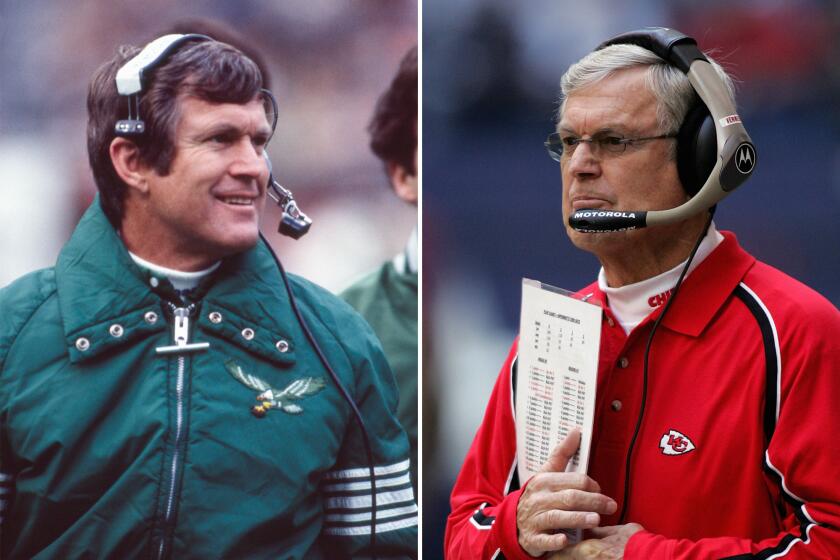Some Say This Is Really a Shoo-In
- Share via
If Shoeless Joe Jackson conspired to fix the 1919 World Series, he certainly went about it in a strange way.
Jackson batted .375 with a record 12 hits and had the only home run of the Series. He drove in six runs and threw out five runners trying to score.
“Could have had three others, if bad cutoffs hadn’t been made,” he once said. But then, with a couple of pitchers and infielders implicated in the Black Sox scandal, it’s understandable that some of Jackson’s throws weren’t handled cleanly.
Shoeless Joe was surrounded by sad-sack statistics accumulated by others involved in the affair. Lefty Williams lost three games and had a 6.61 ERA. Swede Risberg batted .080. Hap Felsch hit .192. Chick Gandil batted .233. All very suspicious numbers. Jackson’s, however, were not.
And yet, commissioner Kenesaw Mountain Landis ignored the acquittal of the eight players by a grand jury, and Shoeless Joe and the others were suspended for life.
“Baseball failed to keep faith with me,” Jackson once said of his suspension notice. “It read if found innocent of any wrongdoing, I would be reinstated. If found guilty, I would be banned for life. I was found innocent and still banned for life.”
That upsets people like Ted Williams, who is campaigning for Jackson to be reinstated by baseball so that he can be eligible for the Hall of Fame. That, Williams believes, is where the man with a .356 career average, third highest in baseball history, belongs.
Williams first learned about Jackson from Eddie Collins, who played in the era of Cobb, Ruth and other baseball greats.
“Collins, all he wanted to do was talk about those guys,” Williams said. “Walter Johnson, Moses (Lefty) Grove, Lou Gehrig. I’d heard of Shoeless Joe and I asked Collins to tell me about him.”
They had been teammates on the 1919 White Sox: Collins, a slick second baseman out of Columbia University who wasn’t involved in the scandal; Jackson, one of the game’s best hitters.
“His head dropped and there was quite a pause,” Williams said, recalling the conversation. “Then he looked to the ceiling and said, ‘Boy, what a player he was.’
“His expression and that pause. That’s something I’ve always remembered. It was said from the heart. I was impressed by the reverence he had for Joe Jackson.”
That reverence is shared by Williams, who will meet with commissioner Bud Selig at the All-Star Game in Boston next month to push for Jackson’s reinstatement. Hall of Famers Bob Feller, Yogi Berra and Tom Lasorda have joined the effort.
A formal review of the case is already under way, spurred by Sen. Tom Harkin (D-Iowa), who became intrigued with the Shoeless Joe story after the movie “Field of Dreams” was filmed in his state.
Shoeless Joe may have been nothing more than a victim of circumstances. He said he was approached by the gamblers and rejected two offers, the first for $10,000, the second for twice that amount. When teammate Lefty Williams arrived at his room after the Series carrying a bag filled with $5,000, Jackson wanted no part of it.
Complicating the case was that Jackson had questionable legal counsel and no apparent help from White Sox owner Charles Comiskey, who, by all accounts of the affair, was more interested in protecting himself than anything or anybody else. There was no players association, no army of attorneys to take up the cause for the banned players.
“It was a severe penalty,” Williams said. “Jackson was never once found guilty. Baseball never proved it was right. He never had a chance to appeal.
“The saddest part of it is that for 80 years, nothing has been done. He served his sentence. He died under it. If he was innocent, that was a crime.”
Jackson, who got his nickname after playing a minor league game without shoes, died in 1951.
There is some evidence that Landis, the newly installed commissioner, saw the Black Sox as an opportunity to make a strong statement. One of the banned players, Buck Weaver, batted .324 in the Series. He was painted with the broad brush of the scandal because he knew of the plot and failed to report it.
That, however, apparently would describe most of Chicago. When Shoeless Joe tried to report it, even asking to be benched for the Series, he was ignored.
“Jackson was never convicted of a felony,” Williams said. “He was convicted by the laws of baseball by a commissioner with more power than had ever been given to anybody. I’m sure Landis made up his mind that whatever it took to restore the integrity of baseball, he was going to do it.”
There is one more wrinkle to this sorry saga.
According to baseball lore, as he left the courthouse where the Black Sox were on trial, Jackson was approached by a towheaded youngster who uttered the phrase, “Say it ain’t so, Joe.”
More to Read
Go beyond the scoreboard
Get the latest on L.A.'s teams in the daily Sports Report newsletter.
You may occasionally receive promotional content from the Los Angeles Times.










